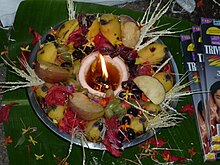
Poorakkali is a traditional dance ritual performed by men during the nine-day Pooram festival in Bhagavathy temples across North Malabar in Kerala State of south India.

Cherpu is a suburb of Thrissur city in the Kerala State of South India. It is 12 kilometres south of Thrissur town and is on the Thriprayar road. It is dotted by a number of temples and has quite a few rivers flowing by its vicinity.
Uthramvilakku is a temple festival celebrated at Edakkunni in Ollur, south of Thrissur in central Kerala, south India. The highlight of the event is an over four-hour Panchari melam in the temple compound past midnight on the uthram day, with each of the five caparisoned elephants on the occasion carrying a deity each from as many temples.
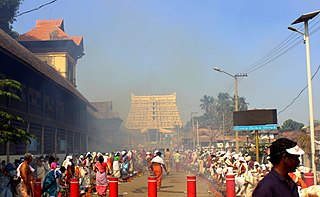
Attukal is a Hindu pilgrimage centre located on the banks of Killi river, in the capital city of Thiruvananthapuram, Kerala, India. It is situated about two kilometres to the south-east from the Padmanabhaswamy Temple.

Manapullikavu is a Hindu temple located in Palakkad city, Kerala of India. The temple is most famous for the annual festival that takes place in the temple known as Manappullikavu Vela. Manapullikavu is also a major residential area in Palakkad city comprising apartments and residential colonies. Manappulikavu is ward 27 of Palakkad Municipality.
Guptan is a Hindu forward community from the Palakkad district of Kerala, South India. The majority of the Guptans are located in Valluvanad, with major agglomerations around Vayillyamkunnu, Kadampazhippuram, Sreekrishnapuram, Chethallur and Mannarkkad. Many Sanskrit scholars and popular astrologers originated from this community.
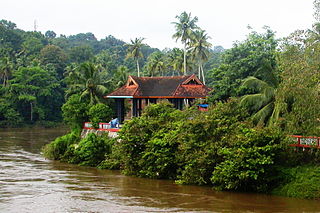
Thazhoor Bhagavathy Kshetram is a 300-year-old Hindu temple on the banks of the Achankovil river in Vazhamuttom, Pathanamthitta District in Kerala. The Devi (goddess) is the main deity here. The centuries-old temple was fully reconstructed in 2020.

The Mullakkal Rajarajeswari Temple is a Hindu temple in Mullakkal, Alappuzha, Kerala, India. The temple was designed and built in the old Kerala style. The temple grounds is filled with jasmine plants, after which the place may have been named, since 'mullai' in Tamil and 'mulla' in Malayalam mean jasmine. There are several stories related to the origin of the temple and its foundation. The idol in the inner shrine is that of the goddess Durga. The temple is run by the Travancore Devaswom Board.
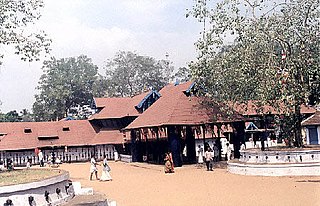
Sree Kurumba Bhagavati Temple is a Hindu temple at Kodungallur, Thrissur District, Kerala state, India. It is dedicated to the goddess Bhadrakali, a form of Mahakali or simply Durga or Aadi Parashakthi or Bhuvaneshwari or Kannagi worshipped and significantly revered in Kerala. The goddess is known also by the names "Sri Kurumba"". This temple is the head of 64 Bhadrakali temples in Kerala. This Mahakali temple is one of the oldest functioning temples in India. The goddess of the temple represents the goddess in her fierce ('ugra') form, facing North, featuring eight hands with various attributes. One is holding the head of the demon king Daruka, another a sickle-shaped sword, next an anklet, another a bell, among others.
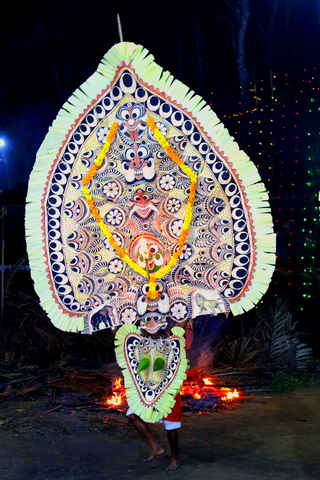
Padayani, also known Padeni, is a traditional folk dance and a ritual art from the central portion of the Indian state of Kerala. A ceremonial dance involving masks, it is an ancient ritual performed in Bhagavati temples. The dance is performed in honor of Bhadrakaali. Meaning, a 'row of warriors', Padayani is an art form that blends all music, dance, theatre, satire, facial masks, and paintings. It is part of worship of Bhadrakali and is staged in temples dedicated to the goddess from mid-December to mid-May. Padayani is unique to central Travancore, comprising the Pathanamthitta and Kottayam districts of Kerala. It is also performed in adjoining regions of Kollam, Alappuzha districts.
Poruvazhy Peruviruthy Malanada, popularly known as Peruviruthy Malanada or Malanada is the one and only one Duryodhana Temple in South India.. It is located at Edakkad Ward (Kara) of Poruvazhy village in Kunnathoor Taluk of Kollam district, India. This place is the northern border of Kollam district which Pathanamthitta and Alappuzha districts share the boundaries. The temple is located equidistant from Adoor to the Northeast and Sasthamcottah to the Southeast. It is also reachable from Kayamkulam and Karunagappally on the NH 47 and Kottarakkara on the MC road.
Oottukulangara Bhagavathy temple is the Hindu temple situated in Peruvemba village of Palakkad district in the state of Kerala.
The primary deity of the temple is Sri Ootukulangara Bhagavathy along with Lord Ganapathy and Lord Ayyappan. The temple timings are from 5 AM to 10.30 AM and 5 PM to 7 PM.
Main offerings for the Ootukulangara Bhagavathy are Chanthatam, Kadumadura Payasam, Villaku, Trikaala pooja and Udayasthamana Pooja along with various other offerings. Chanthatam can be performed only in the morning pooja section of the temple.

Chengannur Mahadeva Temple is a prominent Hindu temple, dedicated to Shiva and located in the town of Chengannur in the South Indian state of Kerala. The temple is one of the major Shiva temples in Kerala, along with the Ettumanoor Mahadevar Temple, Kaduthruthy Mahadeva Temple, Vaikom Temple, Ernakulam Shiva Temple and Vadakkunnathan Temple. goddess Parvati is worshipped with equal importance.There are shrines for Ganesha, Dakshinamurti, Subrahmanya, Shasta, Krishna, Nilagriva, Sthalisha, Hanuman, Ganga, and serpent deities inside and outside the temple complex.

Bhayankavu Bhagavathi Temple is a very sacred Hindu Bhagavathi temple on the Alathiyoor Pallikadavu Road in Kavilakkad, Purathur, Tirur situated in Malappuram district, about 14 km from Tirur Railway Station.

Pattupurackal Bhagavathy Temple is an ancient Bhadrakali temple located in Njeezhoor village, Kottayam, Kerala. It is the only temple in Njeezhoor village where the presiding deity is present. The Offering of naranga vilakku and neivilakku on Tuesdays and Fridays is very significant to this temple. The nearest towns are Kuravilangad and Kaduthuruthy. It is about 6 km and 11 km away from the temple respectively.The last renovation activities of the temple were done on March 19, 2016, with the presence of Kshetra Thantri Brahma Sree Anil Dhivakaran Namboothiri.The temple is managed by NSS Karayaogam Number 336.

Kodungallur Bharani festival is a yearly festival dedicated to the goddess Bhadrakali of Kodungallur Kurumba Bhagavathy temple held between the Bharani days of months Kumbham and Meenam of the Malayalam calendar. This period usually falls between the months of March and April in Roman calendar. This festival traditionally involves sacrifice of roosters, dance of oracles, lighting the traditional lamp, singing of libelous ballads (Bharanippattu) and smearing of the image of the goddess with sandalwood paste.
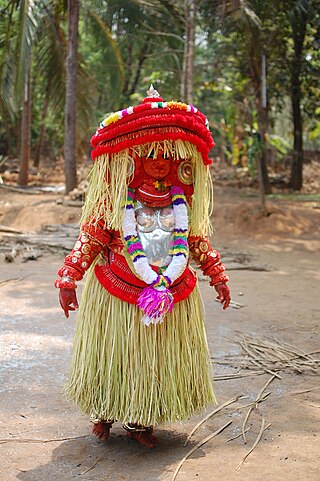
Uchitta Bhagavathy is a regional Hindu goddess worshipped in the North Malabar region in Kerala, India. Uchitta is worshiped and performed as Theyyam form. The main temples of this deity are spread over Kannur and Kasaragod districts in Kerala.

The Oorali Appooppan Kavu is an ancient temple located on the banks of the Achankovil River in Kalleli in the Pathanamthitta district of Kerala, India. The temple is situated on the Kalleli–Achankovil forest route, 19 km (12 mi) from the district headquarters in Pathanamthitta and 9 km (5.6 mi) from Konni. The presiding deity of the temple is Oorali Appooppan, who is considered the lord of mountain gods. The main festival of the temple is Pathamudayam, commencing on Vishu in the month of mēṭam in the Malayalam calendar.
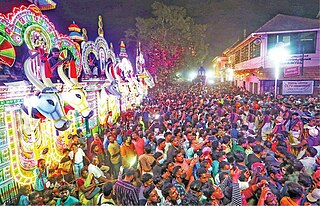
The Vairankode Vela or Vairankode theeyattulsavam, (Malayalam: വൈരങ്കോട് വേല, വൈരങ്കോട് തീയാട്ടുൽസവം) is one of the most popular annual festival of Kerala celebrated at the Vairankode Bhagavathy Temple (വൈരങ്കോട് ഭഗവതി ക്ഷേത്രം) Near Thirunavaya in the Malappuram district.Vairankode Bhagavathy Temple is one of oldest Bhadrakaali temples in North Kerala.

Chithrakkoodakkallu is a house for the deity snakes or a devotional image (Murti) of a serpent deity, used for snake worship. It is constructed with rocks. These consecrations can be seen at sarpa kavus of some ancient, traditional Hindu families and temples throughout Kerala.


